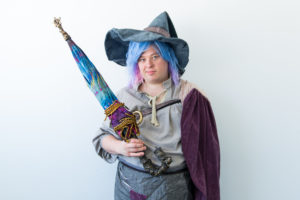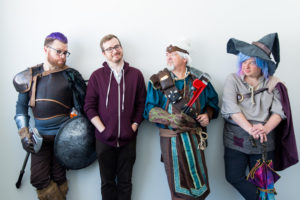Prefer to listen instead? We add new stories regularly to the podcast Timber—Stories for Podcasters.
To the average podcast listener, the process of finding a role-playing game (RPG) podcast is not like landing on whatever the new Serial is. For one, a new Serial is more likely to land on you, through the sheer weight and volume of recommendation lists, profiles, and popular discussions saturating mainstream and social media. But then again, if you are a passionate Dungeons & Dragons fan, you wouldn’t have to go hunting for your new favorite actual-play podcast—in which a group of players record themselves playing the table-top game—in the first place. You’ll likely be so immersed in that world, you’re already a regular listener to about a dozen of its offerings.
“When we started, it was just us being goofy. The show was about us playing the game.”
In this teeming walled garden, away from mainstream media-enabled findability, passionate fans are everything. That’s why the McElroy brothers had something of an edge when they entered the actual-play fray in 2014. By this time, Justin, Travis, and Griffin McElroy were four-year-veterans of their hit unscripted comedy advice podcast, My Brother, My Brother, and Me (known as MBMBAM).
The idea for the new podcast was born on a lark, and out of necessity. “It started when we needed some filler episodes for Justin’s paternity leave after the birth of his first kid,” recalls Travis. “Griffin had been dying for an excuse for all of us to play D&D and the 5th Edition had just come out. He sent each of us one of the starter kits and we were off!”
The first episode, which was meant to be a one-off bonus episode for MBMAM, featured Travis, Griffin, and their father Clint McElroy, a comic book writer and former country music DJ from West Virginia. Griffin, the most seasoned D&D player, ran the show as Dungeon Master, while the rest of them engaged in their customary irrepressible banter, asking for the rules to be re-explained and wanting to know when the real action would start. “When we started, it was just us being goofy. The show was about us playing the game,” recalls Travis. He and his brothers soon warmed up to the storytelling, which, when combined with their improvisational comedy skills, set them apart from existing actual-play podcasts. “I think we were all surprised to find out that we were competent storytellers. Aside from Dad who had written some comics, none of us had done much fiction writing,” he adds.

In the first phase of their Adventure Zone journey, the McElroys followed a pre-scripted D&D campaign. Their characters—Magnus Burnsides, Merle Highchurch, and Taako—accept a gig from a family member, Gundren Rockseeker, who asks them to escort mining supplies to a small town. (Travis’ dog makes a brief appearance as their relative’s pet dog Ruby, described by Griffin as a very ugly bull dog—“basically two butts, with some legs in the middle there,” with a penchant for sleeping among the provisions in the wagon.) The most they expect they’ve signed up for is fighting off bands of crudely armed goblins—rather, in McElroy-speak, “gerblins.”
With each roll of the role-playing dice, the adventure picks up pace. They turn into a potholed road, where they come upon two dead horses. After fighting off some lingering gerblins, they find out that their family member has been spirited away to a defunct mine. The rest of the biweekly comedy/actual play podcast series—27 episodes in all—traces their adventure as they follow their abducted relative to the mines, where they fend off monsters, find a mysterious artefact, and get recruited by a shady, powerful organization called the Bureau of Balance.
A few episodes in, the goofy hijinks suddenly gave way to immersive storytelling—and surprising emotional stakes. “Early on, there was a moment at the end of the first chapter of the story where the three main characters failed to save a town,” Travis recalls. “There were very serious consequences and it brought new stakes that surprised even us.” Much farther in the same campaign, one character was in “serious trouble and the other two spring into action and work in perfect synchronicity to save him.” Travis adds. “Griffin, the one running the game at that point, had to pivot away from what he had planned and it ended up being an incredible moment.”
A passionate following
By the time all this had happened, the McElroys had amassed a heaving number of eager fans, hanging on to every step they took on their mythical journey. “It was because of the reaction and investment from the audience that we realized we were actually telling a story,” says Travis. “People really cared about the characters and that made us take it a lot more seriously!”
What began as a one-off filler episode unfolded into “Balance,” a 69-episode arc, which opened up into a fantasy franchise all its own. The occasionally ribald banter, combined with the brothers’ ability to riff off one another’s pop culture-infused plots and blend fantasy genre tropes with playful satire, made the show what it is: according to its fans, something that can stand toe to toe, and potentially beat, big-screen cinema offerings. In just four years, as a profile in The Ringer pointed out, the show made regular appearances amongst iTunes’ Top 20 comedy podcasts, had racked up nearly 10,000 five-star reviews, and sold out periodic live shows within minutes.
Today, the three seasons—or campaigns— of TAZ have spawned three graphic novels — so far. The first of them, The Adventure Zone: Here there be Gerblins, resulted from a suggestion from the literary agent Charlie Olsen, who asked if they’d considered adapting the show into a comic. “Dad, a lifelong comic aficionado, was instantly on board,” Travis says. “He pitched it to us and got us into the idea as well. Once we partnered with [comic book artist] Carey Pietsch and then [publishing imprint] First Second, it turned into something really incredible. I am so proud to have gotten to work on it.”

The comic topped the New York Times’ trade fiction list and came third in the combined print and e-book fiction list soon after it was released in 2018. This was reported to be the highest spot a graphic novel had reached on the list at the time. A second comic, The Adventure Zone: Murder on the Rockport Limited, which featured “cursed magical artefacts and a pair of meat monsters,” followed in 2019. A third comic, The Adventure Zone: Petals to the Metal, was released last week. Also in the works: their own tabletop card game, The Adventure Zone: the Bureau of Balance, and an animated series in development with the NBC streaming service Peacock.
As for downloads? “We’re at almost 200 million all-time downloads across the series,” says Travis. “We always see a big swell when we near an arc finale episode.”
A listening and actively participating audience
When the show launched in 2014, its first listeners migrated over from their flagship comedy-advice show. “The first episode aired in the MBMBAM podcast feed so that definitely helped,” says Travis. Right from the start, listeners were encouraged to actively take part. “We have been doing a thing since more or less the beginning where, if people tweet about the show, they are in the running to have non-player characters after them,” says Travis. This is why, as his brother Justin has put it, “MBMBAM has an audience. TAZ has a following.”
The McElroys ran shorter exclusive campaigns for donors and held regular live shows, which were recorded and later released online. “The live shows have definitely helped grow the community vibe of the fandom,” Travis adds. “I have also seen people organize their own fan meet-ups at conventions and stuff. I think that has made a huge impact on the TAZ community.”

Among the most prolific participants in the TAZ community are its fan artists, who swarm Pinterest, Twitter, Reddit, and Tumblr with its art, some of which has been immortalized, with accompanying catchphrases, in tattoos. “I also know we owe a lot to the fan art community,” says Travis. “They did a lot of incredible work that got their followers interested in the show. I was also surprised how much life our audience gave the story and characters far beyond anything we ever did. There is amazing art and cosplay out there based on TAZ that just blows me away.” The enthusiasm has been crucial to the success of the show—and its many spin-offs. “Of course, you can’t be successful in podcasting without word of mouth,” he says. “We wouldn’t be where we are without people telling their friends to listen. There are also countless people out there sharing the show on tumblr and reddit and all over the place.”
Lessons learned along the way
Having a massive, passionate fan base can entail being held accountable by them.
The RPG podcast world is hugely diverse. As Hot Pod’s Caroline Crampton noted in a dispatch on a report on the sector, 45 percent of these shows have some LGBTQIA+ representation, 25 percent feature people of colour, and 15 percent have non-binary players. So, when a gay couple appeared to meet an untimely end during the final episode of the first campaign, fans criticized the turn of events as redolent of “Tragic Gay” trope-yness. Griffin McElroy apologized to them on Twitter, and the couple was subsequently resurrected.

The episode was a teachable moment to the McElroys. “I think we have learned a lot about our own privilege and the importance of representation in storytelling,” observes Travis. “It is often the default to just create characters that mirror your own experiences, but if that is all you do it makes for a really boring world. We had to push ourselves, listen to our audience, and be willing to admit that we were wrong sometimes. That can make you feel really vulnerable, but in the long run I think it makes you a better creator.”
Travis says his first bit of advice to anyone aiming to create their own podcast, would be to be kind. “That isn’t so much about making a good show, but I think it is important for being a good creator,” he says. “Also, never take your audience for granted. Listen to them and be willing to admit when you are wrong.” The final lesson? “If possible, make the show with people you love and who you love to entertain. I am endlessly grateful that our listeners like the show, but my goal is always to make my brothers and dad laugh/gasp/have a good time!”




Comments